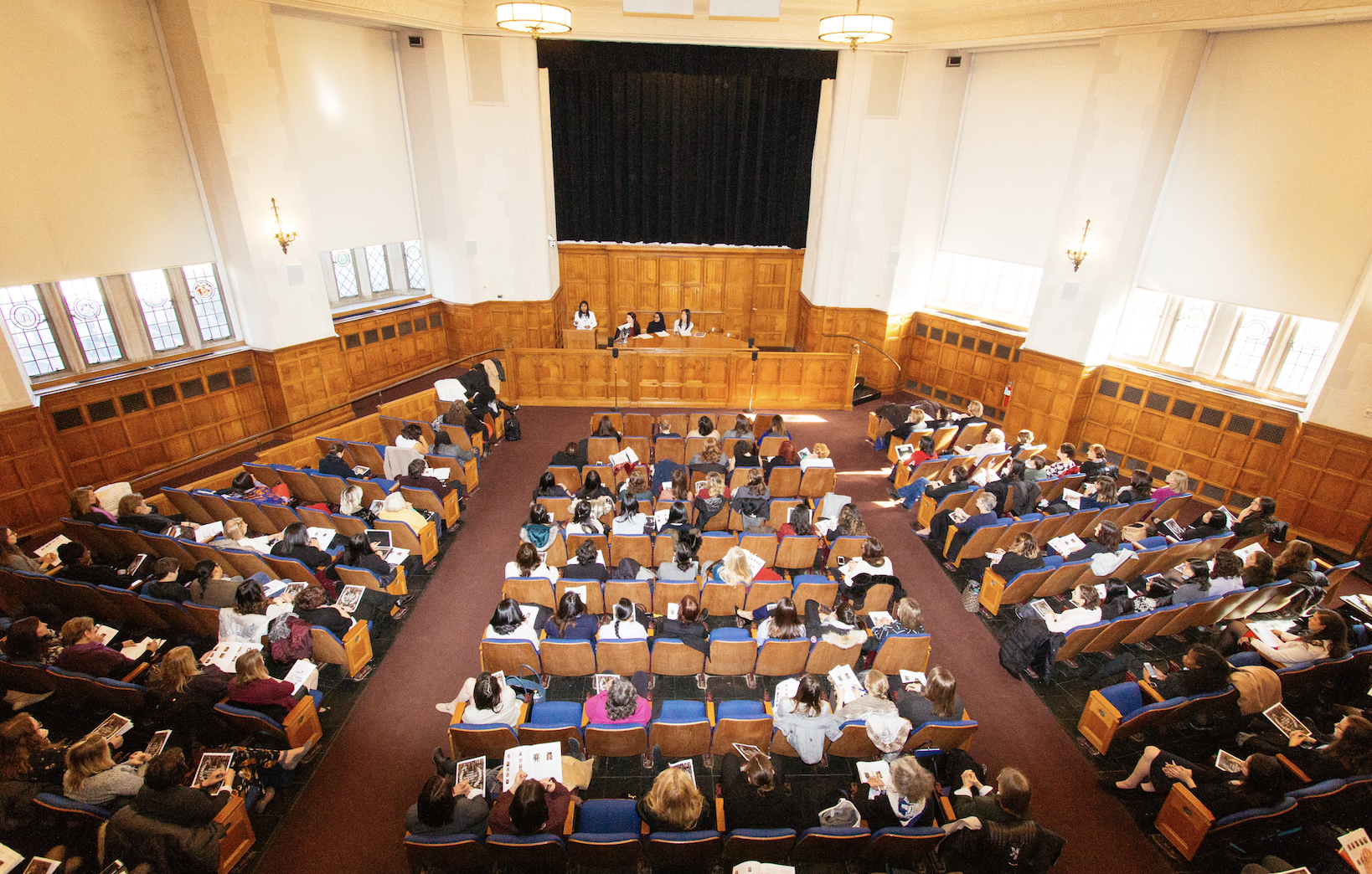
Each day, the Yale Law School auditorium fills to capacity with students hoping to expand their intellectual horizons. Rarely, however, is the auditorium filled, almost exclusively, with women.
The Women Empowering Women conference, which took place in the law school on Saturday morning, featured female leaders from diverse professional fields, including medicine, academia, education and the performing arts, among others. The conference committee of the Yale Women’s Leadership Initiative — an undergraduate organization that, according to its website, “empowers young women to become successful leaders both on campus and in their careers” — organizes the annual conference, which aims to empower women by bringing in accomplished female leaders. This year, about 300 women from Yale and the broader New Haven community attended.
In her opening remarks to the conference, Chelsea Guo ’18, the president of the WLI, highlighted the importance of female leadership.
“All of our invited speakers today understand the truth in women’s empowerment: that the rise of female leaders in America brings with it a bold change in how we define leadership itself,” she said.
She further emphasized the importance of creating a community of women who can unite to combat the problem of society’s devaluation of women but also of some women’s devaluation of themselves.
Following Guo’s opening remarks, conference co-directors Tasnim Mollah ’19 and Valerie Chen ’20 addressed the attendees and introduced the first keynote speaker, Krishanti Vignarajah, who was a policy director for former First Lady Michelle Obama and a senior advisor under former Secretary of State Hillary Clinton LAW ’73 and former Secretary of State John Kerry ’66.
In her speech, Vignarajah addressed current events, such as the women’s marches that took place in the wake of President Donald Trump’s election, and stressed the importance of positive female role models in the development of the next generation of female leaders. She called for an increased effort to move from women “having a seat at the table to being at the head of it.” Vignarajah also spoke about her intention to run for governor of Maryland this November.
Another key issue brought up during the opening ceremony was the significance of engaging all voices in the conversation. Vignarajah addressed the importance of including minority groups such as women of color, LGBTQ women and female immigrants in the conversation about female empowerment, while also striving to include men since “they constitute half of the solution.” In an interview following the ceremony, Mollah similarly expressed hope that the men in attendance would “reach out to their friends and help create a shared vision for empowering women.”
“The WLI prioritizes intersectional leadership and has included various minority groups who are facing different kinds of oppression,” Guo told the News.
After Vignarajah concluded her speech, attendees broke into a discussion session, which included panels on women in law, women in performing arts, Yale alumni and women entrepreneurs.
Susan Chen ’20, the coordinator for the Women in Law panel, expressed her appreciation for the conference and all that it represents.
“It’s so empowering to have all these women together in one place, in one panel, working passionately,” she explained.
She added that she hopes the conference “expand[s] to include other sectors, beyond the ones covered in this conference” in future years.
The first session was followed by another set of panels on women in media, women in education, women in government and women in medicine. At the conclusion of that session, attendees were provided with boxed lunches before the second keynote address by Kathryn Kolbert, who directs the Athena Center for Leadership Studies at Barnard College.
In her speech, Kolbert highlighted the role female voices must play in the fight to protect institutions and rights that are currently under attack. She further called on women to “get out there, work, make a difference, stay angry and organize.”
The third and final session included panels on women in tech, Yale alumni, women in activism and women in academia. After the conclusion of the panels, a networking session took place in the dining hall of the law school.
Interest in this year’s conference was greater than any year in recent memory. The conference’s Facebook event page was oversubscribed, and tickets sold out almost immediately upon their release. According to Mollah, the reception was “unprecedented” not only at Yale, but in the broader New Haven community.
Dori Guzman ’19 backed Mollah’s evaluation of the conference’s positive reception by stating that the conference’s goal was attained and that the presence of such a multitude of highly accomplished women made her feel “inspired and empowered.”
The conference was particularly significant because this year marks the 10th anniversary of the WLI at Yale. As in previous years, the conference aims to accomplish one of the initiative’s three core goals — inspiration. The initiative fulfills its other two goals — celebration and preparation — at the initiative’s annual gala in the fall and the professional network developed by the organization’s business team.
Sophia Catsambi | sophia.catsambi@yale.edu







